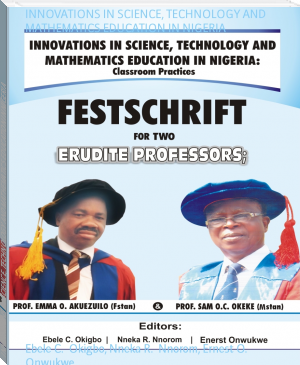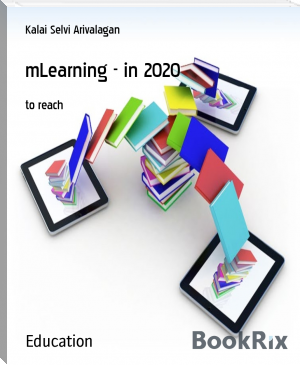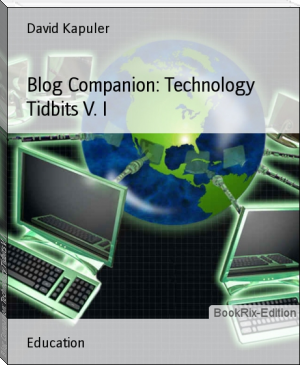INNOVATIONS IN SCIENCE, TECHNOLOGY AND MATHEMATICS EDUCATION IN NIGERIA - Ebele C. Okigbo, Nneka R. Nnorom, Ernest O. Onwukwe (best novel books to read TXT) 📗

- Author: Ebele C. Okigbo, Nneka R. Nnorom, Ernest O. Onwukwe
Book online «INNOVATIONS IN SCIENCE, TECHNOLOGY AND MATHEMATICS EDUCATION IN NIGERIA - Ebele C. Okigbo, Nneka R. Nnorom, Ernest O. Onwukwe (best novel books to read TXT) 📗». Author Ebele C. Okigbo, Nneka R. Nnorom, Ernest O. Onwukwe
In order to prevent any of these the teachers have to be up and doing before, during and after the outdoor educational activity. This could discourage the teacher since there is no immediate physical reward attached.
Inadequate Funding: As some schools if not all rarely included outdoors programme in their school planning and budgeting. This make outdoor educational activity frustrating to the teacher, who is faced with the challenges of raising the necessary funds needed especially when travelling camping are required. Teachers tend to shy away from such venture since it may require their personal financial involvement considering their salary. This poses grate obstacles for the use of outdoor educational activities in the teaching and learning of BST.
Regimented School Timetable: Every primary school teaching and learning activities are guided by the school timetable. This timetable allots specific time for the teaching of each subject in periods. In Nigeria, it is mostly between 40 to 45 minutes for a period. Obviously, double of these periods would not be enough for any meaningful outdoor educational activities especially those that involve travelling. Even the outdoor activities that could be executed within the school environment will encroach into other lesson periods, thereby disrupting the school activities. By this, the teachers are frustrated by when to carry out outdoor activities. This unfortunate situation is as a result of outdoor educational activities not been considered in the schools’ timetable or in the school planning.
Strategies for Effective Utilisation of Outdoor Education in Teaching Basic Science and Technology (BST).
The researcher proffered the following strategies required for effective utilisation of outdoor educational activities in teaching Basic Science and Technology (BST).
Teachers’ Improvement: Teachers should be exposed to the use of the outdoor educational activities the way they are exposed to those of the indoors during their teacher education programmes. The outdoor activities in BST curriculum cannot be effectively utilise if teachers do not have sound knowledge of the use of outdoor educational activities in teaching. In the prevailing circumstance of inadequate provision of sponsored in-service programmes, workshops, seminars and conferences, teacher are urged to sponsor themselves bearing in mind that their positive performance is for their personal growth and productivity. Organisers of teachers’ in-service programmes should emphasise the use of outdoors in teaching science alongside the use of the indoors.
Overhauling of the Primary School Structure: In most Nigerian primary schools, a teacher is in charge of a class. This teacher is expected to teach all the subjects in that class. With the lunch of the UBE, more subjects have been introduced to the primary schools coupled with increase in the population of the pupils. The teachers now have their hand full with heavy workloads of teaching these subjects and controlling a large number of pupils in a class. This present situation in the primary schools should be reviewed in terms of the nature of classroom lesson delivery and number of pupils in a class. The State Universal Basic Education Board (SUBEB) should divide the primary school into two; the lower and middle basis primary schools and employ more teachers to manage the administrations and classrooms in these schools. No class teacher should have more than 25 pupils in a class. The class teacher should be relived from teaching all the subjects offered in the class and special subject teacher are to be employ for subjects like Basic Science and Technology, Mathematics, Agricultural Science, and Languages. This will reduce the workload of the primary school teachers and enable the Basic Science and Technology teacher to plan and execute any outdoor educational activity along with the class teacher.
Development of Outdoor Educational Handbook: The planning and execution of certain outdoor educational activities could be stressful couple with the risks that could be associated with such activities. The BST curriculum writers should develop a handbook that would guide the teacher’s preparation, execution and management of risks and other things that may be associated with the outdoor educational activities in the curriculum.
Inclusion of Outdoor Educational Activities in Each Term’s Programme by the School Management: The BST teacher should plan all the outdoor educational activities including the financial involvements ahead on time and submit a proposal to the school management before the commencement of any term. This is to enable the school management make all the necessary arrangement in terms of finance, consultations, allotment of time for such activities while making plans for the term. With such arrangement, constrains like funding, administrative bottlenecks, insufficient time for outdoor educational activities in the time table could be alleviated
Conclusion
The use of outdoor education in teaching Basic Science and Technology should be encourage because it helps demystifying science concepts. It also contextualises science concepts to the learners since the outdoor environment forms part of the learners’ environment. It could also arose and sustain the interest of the learner in the study of science and technology. Such learner tends to study science or technological related subjects or courses in higher institutions, and subsequently be a professional in these areas. The effective utilisation of outdoor educational activities in the Basic Science and Technology curriculum can be achieved through the teacher, the school management, the State Universal Basic Education Board (SUBEB) and curriculum writers. In this guise, they should adopt some strategies to subdue challenges that tend to fight their effort to achieve effective utilisation of outdoor educational activities in the curriculum.
References
Adeniyi, E. O. (2007). 9-year Basic Education Curriculum: Basic Science and technology. Nigerian Educational Research and Development Council (NERDC). Abuja: NERDC
Ali, A. (1998). Strategic issues and trends in science education in Africa. Onitsha, Nigeria: Cape Publishers International Limited.
Brügge, B & Szczepanski, A. (2011). The Root of Outdoor Education. Kinda Education Center. From www.kinda.se/download/18.68cc47d1351fbb3d6fa06/1329387472156/The+roots+of+outdoor+edcation.pdf.
Conway, C. (2010). Outdoor & nature education.http://www.ericdigests.org/pre-923/outdoor.htm.
Damole, B.T. (2011). Emerging issues on universal basic education curriculum in Nigeria: Implication for the science and technology component. Pakistan Journal of social science, 8(1), 54-61.
Dietz, K. A. (2002). Influence of Teaching in an outdoor classroom on kindergarten children’s comprehension and recall of a science lesson. A Master degree thesis submitted to the Graduate Faculty in the Department of curriculum and instruction of the Louisiana state university and Agriculture and Mechanical College.
Federal Government of Nigeria (2004). National policy on education. Lagos: NERDC
Federal Government of Nigeria (2007). National policy on education. Abuja: NERDC
Igbokwe, U. L (2009). Classroom Management for Curriculum Implementation. U. L.
Igbokwe and U. N. Eze (Eds). Classroom Management for Curriculum Implementation: Applying Psychological Principles. Enugu: Timex Publishers.
Ihebereme, C. I. (2009). Challenges to effective teaching in the lower and middle universal basic education and strategies required of the teacher. Journal of the Nigerian Academy of Education (JONAED,) 5(1); 103-113.
Iwu, C. G. & Iwu, C. I.(2013). Factors inhibiting effective management of primary schools in Nigeria: The Case of Ebonyi State. http://www.krepublishers.com/02-Journals/JSS/JSS-35-0-000-13-Web/JSS-35-1-000-13-Abst-PDF/JSS-35-1-051-13-1438-Iwu-CG/JSS-35-1-051-13-1438-Iwu-CG-Tx%5B6%5D.pmd.pdf.
Kolawole, B. E. (2011). The teacher effectiveness in improving the attitude of students towards science subjects. Effective strategies for the teaching of Science, Technology & Mathematics Education (STME),1; 84- 92.
Obioma, G. (2007). 9-year basic education curriculum:Basic science and technology. Nigerian Educational Research and Development Council (NERDC): Abuja.
Odili, J. N., Ebisine, S.S. & Ajuar, H. N. (2010). Teachers’ involvement in implementing the basic science and technology curriculum of the 9-year basic education. The Proceedings of The 24th Congress of the Nigerian Academy of Education.
Ogwudire-Chukwudire, H. U. C. (2004). Educational Psychology: Principles of Human Growth and Development. Owerri: Nigeria, Udebiuwa Press.
Osuji, S.N. (2009). Teacher education curriculum in Nigeria in the perspective of lifelong education. The Journal of International Social Research, 2(8);296-301 http://www.sosyalarastirmalar.com/ciltz/sayi8pdf/osuji.pdf
Ukah, V. I. (2014). Teachers’utilisation of outdoor science educational activities in teaching basic science and technology. A masters Degree thesis submitted to the department of Science Education, Faculty of Education, University of Nigeria, Nsukka.
Yusuf, A. & Ajere, R.O. (2009). Universal basic education (UBE) in Nigeria. www.unilorin.edu.ng/publications/comrade/universal-BASIC-EDUCATION-(UBE)-IN-NIGERIA.pdf.
INNOVATION IN STEM EDUCATION: AN IMPERATIVE TOOL FOR IMPROVING BIOLOGY TEACHER CLASSROOM PRATICES IN NIGERIA
Chris O. Obialor
Gloria O. Ezeobi
&
Gertrude C. Ezenwabuchili
Abstract
This paper discussed the innovations in STEM education as an imperative tool for improving biology teacher classroom practice in Nigeria. It examined the concept of innovation, biology and STEM educations. It also highlighted the innovations in STEM education and the challenges militating against biology teacher application of innovation in STEM education in classroom practices. The paper recommended among others that Government should utilize the services of various bodies such as Science Teachers Association of Nigeria( STAN), faculties and institutes of education in universities to organize in serving training programmes, workshops, and seminars for serving biology teachers on recent approaches of STEM instructional techniques and the importance of using them in a classroom setting
Keywords: Innovation, STEM Education, Classroom Pratices
Introduction
Biology is a Science, Technology and Mathematics Education (STEM) Subject. Among all the STEM subjects offered by students in Nigeria secondary schools; biology is considered the broadest, cutting across almost the science fields and as such seems to had been a popular subjects offered by both science oriented and art based students’ in Senior Secondary Certificate Examination (SSCE) in Nigeria. Despite the popularity of biology among students, students’ performance in this subject (biology) at external examination had remained persistently poor (obialor, 2018). Report from Scholars and educators like opara (2011) , Anyaegbunam, Nwodo and Eribe (2015) WAEC 2012-2017, is a good evidence.
Several researchers have pointed out different factors responsible for this poor performance of students in senior secondary school biology. Some of the factors identified include abstractness of certain aspects of biology, lack of understanding of concepts and terminologies taught, use of inappropriate instructional materials and poor teaching methods by teachers (Emosole & Ekholuentale, 2016; Nzelum 2010; Nzewi, 2005; Okoli, 2006; Okeke & Ochuba, 1999). Okoli (2006) opined that most science teacher still prefer lecture method of teaching, that is ,a teaching method in which the teacher presents spoken discourse on a particular subjects and avoids the use of activity-oriented teaching methods which are student-centered such as inquiry methods, discovery method and investigative laboratory approach. Obialor (2016) maintained that such teacher-centered approach in which there is a flow of information going from the teacher to the students does not enhance achievement in science subjects particularly biology. However, many studies have been done towards improving the performance of students in senior secondary school biology examination. Yet, one still notices poor academic achievement of students’ in biology. This could be because biology teachers may not have considered the innovation in STEM education.
Innovation in STEM education requires that the teaching and learning of Science, Technology, Engineering and Mathematics education, biology inclusive is shift from dominant teacher- centered approach to student-centered approach of learning (Tavis & Lord, 2004). In this kind of approach, the students actively carryout experiments and activities and reach their own conclusion. Evidence show that one of the most effective ways to increase students’ accountability and understanding is to utilize instructional strategies that have students work in small heterogeneous groups of three or four students, using the child centered approach ( Lord, 2004). By this, students’ not only learn from their presenters but also from their peers. Okebukola (2005) added that good teachers of science (biology) create environment in which they and their students work together as active learners. They ensure that the presents the content and learning materials clearly so that the learners can understand the lesson taught. A good teacher of science also inculcate in students the following skills; critical thinking, problem solving, collaboration, communication (written and oral), curiosity and technological skills. Prior to this, there is need to emphasized on biology teachers application of innovation in STEM education in their classroom practice in order to improve the students’ academic achievement in biology.
Innovation
Innovation according to Gertner (2012) and Manzi (2012) is the application of idea or invention, adapted or refined for





Comments (0)